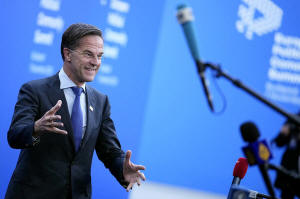50 European leaders assess how Trump will affect their fortunes and seek
a common stance on Russia
 Send a link to a friend
Send a link to a friend
 [November 07, 2024]
By RAF CASERT and JUSTIN SPIKE [November 07, 2024]
By RAF CASERT and JUSTIN SPIKE
BUDAPEST, Hungary (AP) — Around 50 European leaders, including Ukrainian
President Volodymyr Zelenskyy and NATO Secretary-General Mark Rutte,
were reassessing their trans-Atlantic relations at a summit Thursday in
the hope that Donald Trump's second U.S. presidency will avoid the
strife of his first administration.
European officials will also be seeking a strong common stance on Russia
at the one-day gathering.
Rutte, who was Dutch prime minister during Trump's first 2017-2021
presidency, said that “I worked with him very well for four years. He is
extremely clear about what he wants. He understands that you have to
deal with each other to come to joint positions. And I think we can do
that.”
And he insisted that the common challenges posed by Russia in Ukraine
affected both sides of the Atlantic.
“Russia is delivering the latest technology into North Korea in return
for North Korean help with the war against Ukraine. And this is a threat
not only to the European part of NATO, but also to the U.S. mainland,”
Rutte said coming into the summit.
Trump strongly pushed the European NATO allies to spend more on defense
during his first presidency, to up and beyond 2% of gross domestic
product and to be less reliant on U.S. military cover. That point has
totally sunk in.

“When he was president, he was the one in NATO who stimulated us to move
over the 2%. And now, also thanks to him, NATO, if you take out the
numbers of the U.S., is above the 2%.,” Rutte said.
Charles Michel, the council president of the 27-nation European Union,
agreed that the continent needed to become less reliant on the United
States.
“We have to be more masters of our destiny," he said. "Not because of
Donald Trump or Kamala Harris, but because of our children.”
During his election campaign, Trump has threatened anything from a trade
war with Europe to a withdrawal of NATO commitments and a fundamental
shift of support for Ukraine in its war with Russia — all issues that
could have groundbreaking consequences for nations across Europe.
Trump has said he would end the war in Ukraine, now well into its third
year, within days of being reelected. Ukraine and many of its European
backers fear that this means a peace on terms favorable to Russian
President Vladimir Putin and involving the surrender of territory.
[to top of second column]
|

NATO Secretary General Mark Rutte speaks with the media as he
arrives for the European Political Community (EPC) Summit at the
Puskas Arena in Budapest, Hungary, Thursday, Nov. 7, 2024. (AP
Photo/Petr Josek)

European allies in NATO hope to convince Trump that if he helps to
negotiate any peace, it should be done from a position of strength,
for both Ukraine and the United States.
Hungarian Prime Minister Viktor Orbán, the summit’s host and an
ardent Trump fan, said early Thursday that he already had a phone
call with the incoming president overnight, announcing that “We have
big plans for the future!”
So did hard-right Italian Prime Minister Giorgia Meloni, who lauded
the “deep and historic strategic partnership that has always tied
Rome and Washington.”
That partnership came under constant pressure during Trump’s first
term, from 2017-2021.
Trump’s administration slapped tariffs on EU steel and aluminum in
2018, based on the claim that foreign products, even if produced by
American allies, were a threat to U.S. national security. Europeans
and other allies retaliated with duties on U.S.-made motorcycles,
bourbon, peanut butter and jeans, among other items.
The impact of the U.S. election result could be felt in Europe for
years to come, on issues including the wars in Ukraine and the
Middle East, as well as migration and climate change.
Among the leaders, Zelenskyy, who is expected to make another plea
for more aid as his country fends off Moscow’s invasion. The timing
is laden with significance as Trump has vowed to end the war “within
24 hours” of being elected — something leaders in Kyiv interpret as
an impending evaporation of U.S. support following Trump's win.
Further compounding an already complicated situation, Germany —
Europe’s troubled economic juggernaut — sank into political crisis
after German Chancellor Olaf Scholz fired his finance minister. It
raises the specter of an election in a few months and yet another
standoff between the emboldened hard right and the establishment
parties in Europe.
Those two combined “adds even more pepper and salt to this
situation,” Polish Prime Minister Donald Tusk said.
___
Lorne Cook contributed to this report from Brussels.
All contents © copyright 2024 Associated Press. All rights reserved |